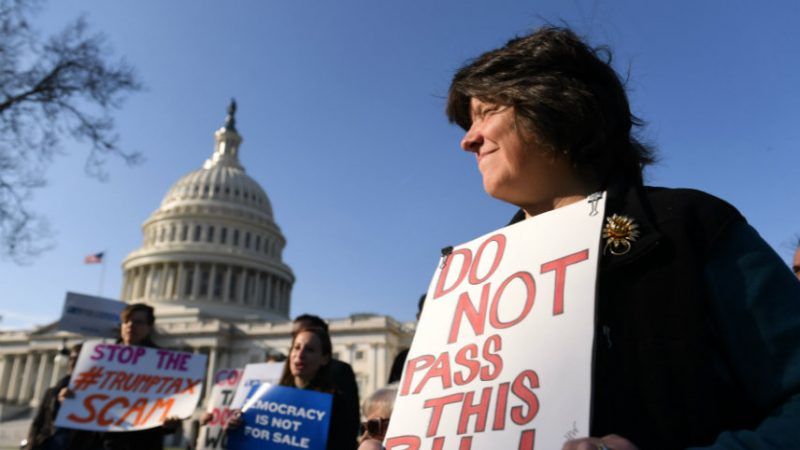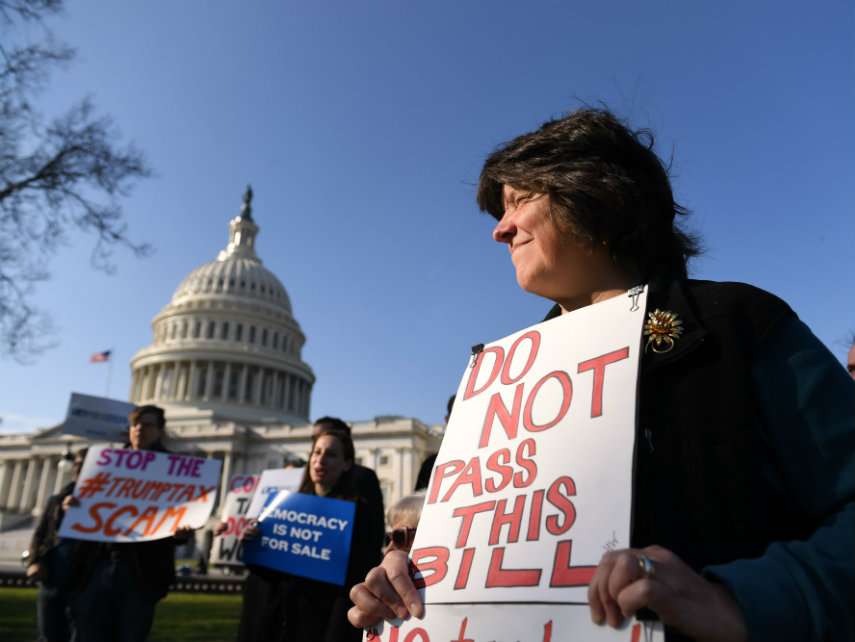Tax Bill Mixes Very Encouraging Developments With Very Disappointing Ones
The GOP would be on higher ground if it stood on principle for a tax code that treats everyone the same.


What to make of the Tax Cuts and Jobs Act, the legislation passed by the Senate at 1:36 a.m. Saturday, by a 51 to 49 vote, with only Republicans in favor?
Any final assessment has to await a conference with the House of Representatives that will attempt to bridge differences between the Senate bill and the one already passed by the House.
For now, though, the legislation is a mixture of really encouraging developments and really disappointing ones.
Encouraging is the reduction of the corporate tax rate to 20 percent from 35 percent. Politicians from both parties have long acknowledged that the U.S. corporate rate is so high that it hurts American competitiveness. President Obama in 2012 proposed reducing the rate to 28 percent, and eventually talked about a 25 percent rate for some manufacturers.
A 20 percent rate, or even 22 percent, would be an improvement. It would still leave America's corporate tax rate higher than places like Ireland, where the rate is 12.5 percent. But it'd be a big step in the right direction, toward solving what even Obama acknowledged was a problem. The Senate waits until 2019 to deliver the 20 percent corporate rate, while the House bill puts it into effect in 2018.
Also encouraging is the prospect—somewhat shocking, isn't it?—of politicians actually following through on a campaign promise. The potency of tax cuts as a political issue has been eroded over time by politicians who pledge them but fail to deliver. The Republicans haven't managed to achieve their long-promised repeal of ObamaCare. Successfully getting a tax cut passed into law after being elected in part to bring one about is almost enough to warm a voter's heart, or to restore a person's faith in government's ability to act on the signals sent by elections. It's an antidote to cynicism.
Unfortunately, by that same standard, aside from the rate cuts, the content of the bill itself and the process behind it so far are pretty disappointing. The middle of the night, weekend, party-line vote is the sort of thing that Republicans complain about, with some merit, when Democrats control Congress. A full text of the 479-page bill was provided to senators only hours before the voting began, and it was full of hand-written cross-outs and marginal emendations. The Senate bill doesn't meaningfully simplify the tax code. A lot of Americans will need not just a journalist or a politician but an accountant or a tax lawyer to explain to them how it will affect them.
There's an element of the whole thing that reminds me of the home renovation horror story about the guy who starts out replacing a doormat and winds up having to redo the entire kitchen—what project managers call "scope creep." The Republicans set out to lower the corporate tax rate. Once they did that, then rates for businesses organized in other ways looked low, so they had to lower those, too. And once that was done, budget rules meant they had to "recover" the "lost revenue" somehow, with a variety of minor adjustments, even tax increases. Together, those add up to lots of work for lobbyists and accountants. They can be revisited in coming years as a way to milk campaign contributions out of the interested parties.
Particularly dangerous is the practice of a political party using the tax code to reward its backers and punish its enemies. Republicans, who now control the White House and both parties of Congress, may find it humorous or convenient to raise revenue by increasing taxes on a handful of well endowed universities with overwhelmingly liberal faculties, and on the mostly Democratic-leaning cities and states with high state and local income taxes.
But there will come a time when the tables are turned, and Democrats will then be tempted to alter the tax code in a way that punishes Republicans. The GOP would be on higher ground if it stood on principle for a tax code that treats everyone the same.
Avoiding this sort of petty political vindictiveness is one of many reasons why a lot of people would prefer keeping their money in their own pockets in the first place, rather than sending it to Washington to be doled out by politicians to favorites in the form of either spending or narrowly targeted and easily reversible tax breaks.
In the end, the best news of all about a tax cut may be that it leaves the politicians and lobbyists in the Washington swamp even less of our money to mess around with.
